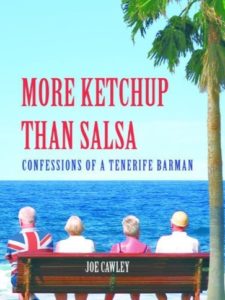
Good Hotel Guide
Hostels and Hotels in Derby
Do you have a hotel or B&B in any of these locations then please contact us to list your hotel below, free of charge.
Alfreton, Ashbourne, Bakewell, Belper, Burton-On-Trent, Derby, Heanor, Ilkeston, Matlock, Ripley, Swadlincote
For UK travelers going abroad, we recommend Tenerife, with feel of the UK yet all the sun of Tenerife. Read an extract below from More Ketchup than Salsa, the story of a English couple who left the UK to set up life in Tenerife. Info on how to buy the book can be found below.
List your Hostel in Derby
Below you will find short extracts from More ketchup than Salsa by Joe Cawley – not to be missed.
Short Extract

Get the book
Tenerife!’ exclaimed Joy. Yes, we own a villa out there. We try to get over as much as possible, you know, to get away from this frightful weather.’ Her accent had suddenly jumped up a couple of social classes to underline her ownership status. ‘Have you been?’ Oh aye,’ said Joy brightly. ‘We’ve bought a bar-restaurant there. We’re moving in a few days. Maybe we’ll see you there.’ Yes you might well,’ answered the woman faintly. The woman was no newcomer to the market and had been on the receiving end of teasing before. You couldn’t blame her for doubting that a couple of fishmongers wearing rabbits on their heads had bought a business on her island.
Alfreton, Ashbourne, Bakewell, Belper, Burton-On-Trent, Derby, Heanor, Ilkeston, Matlock, Ripley, Swadlincote
We found a spot on the newly created Las Américas beach. I say newly created as the coastline, although beautiful in a rugged sense, was originally just a series of rocky crags interspersed with pockets of coarse black sand, remnants of Tenerife’s volcanic birth. As the tourism industry quickly took hold of the island, it wasn’t long before the authorities recognised the fact that Northern Europeans weren’t in the least bit attracted to bitumen-coloured beaches. Buckets and spades were sent to the Sahara Desert to dig up the preferred golden variety and transport it back across the water, where it was dumped at the feet of huge hotels to cover up unsightly black roots. Naturally, environmentalists were none too pleased with this trans-continental transfer of earthly treasure. Consequently, many of the South’s other beaches had to draw on sub-oceanic reserves, sucking golden sand (and startled marine life) off the seabed, blowing it along lengthy sections of tubing and spitting it back out onto dry land, just like the one in Las Américas. Joy and I pitched camp between two families. One was Spanish, several generations sheltering from the sun under a marquee of overlapping beach brollies. A wall of towels draped from the umbrellas provided security from the gusts of sea breeze, protecting the picnic they had laid out on one of the white plastic sunbeds. A carpet of remaining towels protected the delicate feet of the younger members of the family from the hot sand.
Originally dubbed ‘the poor man’s market’ in what was a working man’s town built on the prosperity of the local cotton mills, Bolton market was subsidised by the council to provide cheap food and clothing for low-income workers. (In a flourish of affluent delusion it has since been completely refurbished and modernised. The rats get to scamper around on fitted nylon carpets amid designer lighting franchises. An elegant coffee shop offering vanilla slices on dainty china now occupies the spot where once the best meat and potato pie sandwiches in Lancashire were messily consumed by fishy-fingered stall workers like me.) It was an undemanding job both physically and mentally, which suited me fine. Stress was for the rich and hardworking, characteristics that were never going to be heading my way. That’s not to say that I was content. A string of menial jobs had taught me that contentment is not always found on the path of least resistance, but I had found myself meandering towards that monotonous British lifestyle of schooljobpensioncoffin, and something needed to be done fast. I had grown bored with the same old stallholder banter ‘We’re losing a lot of money, but we’re making a lot of friends,’ or ‘Oh yes, love, it is fresh, it will freeze.’ I was becoming less and less amused by the teasing of old ladies as they stood at the stall with purses wide open, names inadvertently displayed on their bus passes.
